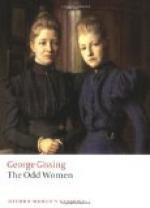Monica, at first very attentive, was growing absent. Her eyes wandered about the room. The other observed her closely, and, it seemed, doubtfully.
‘Do you feel any impulse to try for it?’
‘I should have to live for six months without earning anything.’
‘That is by no means impossible for you, I think?’
‘Not really impossible,’ Monica replied with hesitation.
Something like dissatisfaction passed over Miss Nunn’s face, though she did not allow Monica to see it. Her lips moved in a way that perhaps signified disdain for such timidity. Tolerance was not one of the virtues expressed in her physiognomy.
‘Let us go back to the drawing-room and have some tea.’
Monica could not become quite at ease. This energetic woman had little attraction for her. She saw the characteristics which made Virginia enthusiastic, but feared rather than admired them. To put herself in Miss Nunn’s hands might possibly result in a worse form of bondage than she suffered at the shop; she would never be able to please such a person, and failure, she imagined, would result in more or less contemptuous dismissal.
Then of a sudden, as it she had divined these thoughts, Rhoda assumed an air of gaiety of frank kindness.
’So it is your birthday? I no longer keep count of mine, and couldn’t tell you without a calculation what I am exactly. It doesn’t matter, you see. Thirty-one or fifty-one is much the same for a woman who has made up her mind to live alone and work steadily for a definite object. But you are still a young girl, Monica. My best wishes!’
Monica emboldened herself to ask what the object was for which her friend worked.
‘How shall I put it?’ replied the other, smiling. ’To make women hard-hearted.’
‘Hard-hearted? I think I understand.’
‘Do you?’
‘You mean that you like to see them live unmarried.’
Rhoda laughed merrily.
‘You say that almost with resentment.’
‘No—indeed—I didn’t intend it.’
Monica reddened a little.
’Nothing more natural if you have done. At your age, I should have resented it.’
‘But—’ the girl hesitated—’don’t you approve of any one marrying?’
’Oh, I’m not so severe! But do you know that there are half a million more women than men in this happy country of ours?’
‘Half a million!’
Her naive alarm again excited Rhoda to laughter.
’Something like that, they say. So many odd women—no making a pair with them. The pessimists call them useless, lost, futile lives. I, naturally—being one of them myself—take another view. I look upon them as a great reserve. When one woman vanishes in matrimony, the reserve offers a substitute for the world’s work. True, they are not all trained yet—far from it. I want to help in that—to train the reserve.’




